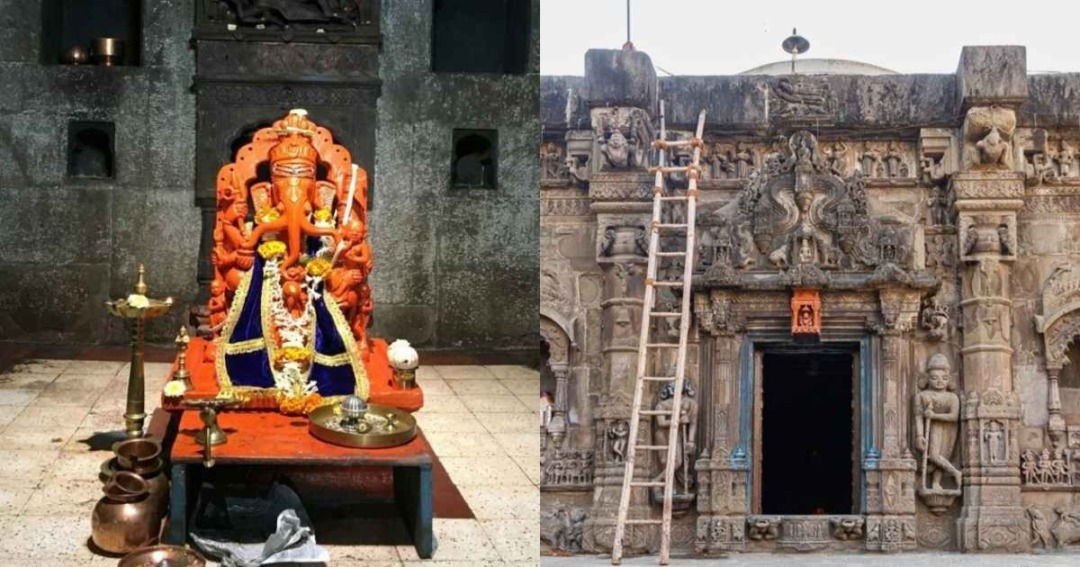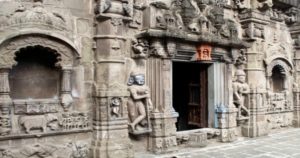
![]()
Visit Trishund Mayureshwar Ganpati Mandir, Pune — the only temple where Lord Ganesha sits on a peacock, adorned with three trunks and six arms. A 250-year-old heritage marvel, it’s truly one of a kind.
What Makes It Unique
Unlike the familiar form of Lord Ganesha with a single trunk and mouse as his vahana, here He appears in a truly exceptional form:
- Three trunks, six arms, and seated on a peacock (Mayureshwar).
- This is believed to be the only Ganesh idol of its kind in the world.
- Symbolically, the three trunks are said to represent the Trimurti (Brahma, Vishnu, Shiva), the past, present, and future, or the material, spiritual, and intellectual realms of existence.
History & Architecture

The Trishund Mayureshwar Ganpati Mandir was built between 1754–1770 by Bhimjigiri Gosavi, a revered saint of the Giri Gosavi sect. Unlike the grand Maratha-era temples of its time, this shrine carries a distinct blend of styles and unusual symbolism that make it stand apart.
- Stonework & Style: The temple is constructed entirely from black basalt stone, showcasing architectural influences from Rajasthan, Malwa, and South India — a rare combination in Pune’s temple landscape. Its carved pillars, domed niches, and ornate motifs reflect the sect’s eclectic spiritual approach.
- Rare Carvings: The outer walls are adorned with carvings of mythological figures, deities, animals, and floral motifs. Among these is a particularly intriguing scene — a British soldier tying a rhinoceros, which many historians interpret as a reference to the Battle of Plassey (1757), marking the rise of British power in India.
- Multilingual Inscriptions: The presence of both Sanskrit and Persian inscriptions on the walls reflects the cultural crossroads of 18th-century India, when Maratha, Mughal, and colonial influences intersected.
- Hidden Chamber: Beneath the sanctum lies a basement meditation hall, built as the resting place (samadhi) of Bhimjigiri Gosavi. This chamber is opened only once a year on Guru Purnima, when special rituals are performed, adding to the temple’s mystical aura.
Spiritual Significance
- The peacock vahana represents purity, wisdom, and spiritual awakening.
- The three trunks highlight Ganesha’s mastery over cosmic balance — creation, preservation, and destruction.
- Devotees believe that prayers offered here not only remove obstacles but also help in gaining deeper clarity in life.
Travel Guide
? Location: Somwar Peth, Pune (near Kamala Nehru Hospital Chowk)
? Timings: 7 AM – 12 PM, 5 PM – 9 PM
âœˆï¸ Nearest Airport: Pune International Airport (11 km)
? Nearest Railway Station: Pune Junction (3 km)
? Access: Best reached via auto or cab; final stretch requires a short walk through narrow lanes.
Nearby Attractions in Pune
- Dagadusheth Halwai Ganapati Temple – 2 km
- Shaniwar Wada – 1 km
- Pataleshwar Cave Temple – 3 km
- Aga Khan Palace – 9 km
The Trishund Mayureshwar Ganpati Mandir is not just a temple; it’s a spiritual and historical treasure. With its rare idol, mystical aura, and heritage-rich carvings, it offers a deeper, more intimate side of Ganesh worship compared to Pune’s grander celebrations.
If you’re visiting Pune, don’t miss this hidden gem — it’s where faith, history, and artistry come together in one unforgettable experience.



